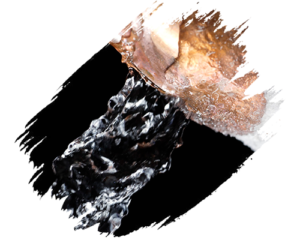This year, the UK has one of the coldest° November days in 13 years* (*BBC)
Freezing temperatures can present serious hazards to people and property. One of the biggest risks during periods of extremely cold weather is escape of water, which is among the leading causes of property claims. The Association of British Insurers says insurers pay out an average of £1.8m per day for escape of water claims.

Prolonged periods of very low temperatures can lead to pipes freezing and bursting, which can have serious consequences. It can often leave people without water and electricity, and facing costly repair bills
Check you know where your stopcock tap is and that it works – if you suffer from burst water pipes during the winter you will need to turn it off quickly to prevent water escaping and causing damage.
Stopcocks can be found under the kitchen sink, ground floor bathrooms, basements and garages
Practical steps to protect property
There are a number of simple, practical steps that can help to minimise the risk of escape of water and damage to property during the winter months. These include:
- Ensuring that all pipes and water tanks are adequately lagged, and that properties are kept above 10℃ at all times
- Fitting frost thermostats to ensure that boilers and heating systems come on automatically in cold periods
- Inspecting and maintaining boilers and other heating systems under a full maintenance contract
- Draining and disconnecting water pipes, tanks and heating systems in buildings that are permanently unoccupied
- Insulating external water taps to protect them from frost
- Clearing gutters of fallen leaves and debris to reduce the risk of overflowing water
- Understanding the locations of stopcocks so that water can be quickly turned off in an emergency
- Preventing trips and slips
- It is equally important to ensure that access and exit routes can be safely negotiated in wintry conditions. Should somebody fall and hurt themselves on an icy path for which you are responsible, you could face a personal injury claim.
What to do if you’re going away
If you’re going away, it’s worth getting someone to check in and keep an eye on your home, especially over the Christmas period. If you are away overnight, leave the heating on at 10°c so that warm water is circulating around the pipes.
If you’re away for longer, there are some useful tips to help protect your home:
- Royal Mail Keepsafe service can prevent a pile of post accumulating which can be a tell-tale sign there’s no one home.
- Don’t over-share your travel plans on social media or otherwise- you never know who could be watching.
- Install a light timer.
The importance of inspections and risk assessments
Regular property inspections are vital to help identify potential risks. A risk assessment should first be undertaken to establish how frequently inspections are needed, which will depend on the property. It is also important to document the findings of your inspections, even if no action was subsequently required.
However, that does not mean that in order to avoid such claims, it is necessary to clear every last inch of snow from every car park or pathway. In fact, these could cause ice to develop much faster. It is simply about being able to demonstrate you have taken precautions to ensure the reasonable safety of people on the premises, for example by clearing the most frequently used access routes. Further guidance on preventing trips and slips is provided by the HSE.
Overall, an effective winter maintenance policy is crucial and will assist in preventing damage to property and infrastructure, as well as reducing the risk of harm to people, but it is crucial that staff are aware of the policy and that the policy is followed, with decisions taken fully documented and available for review at a later stage, should the need arise.
